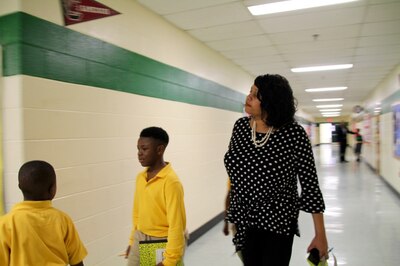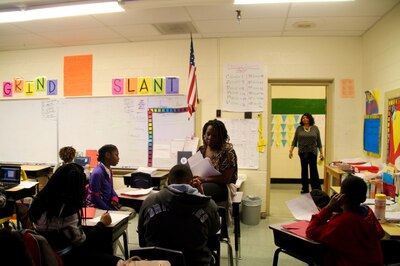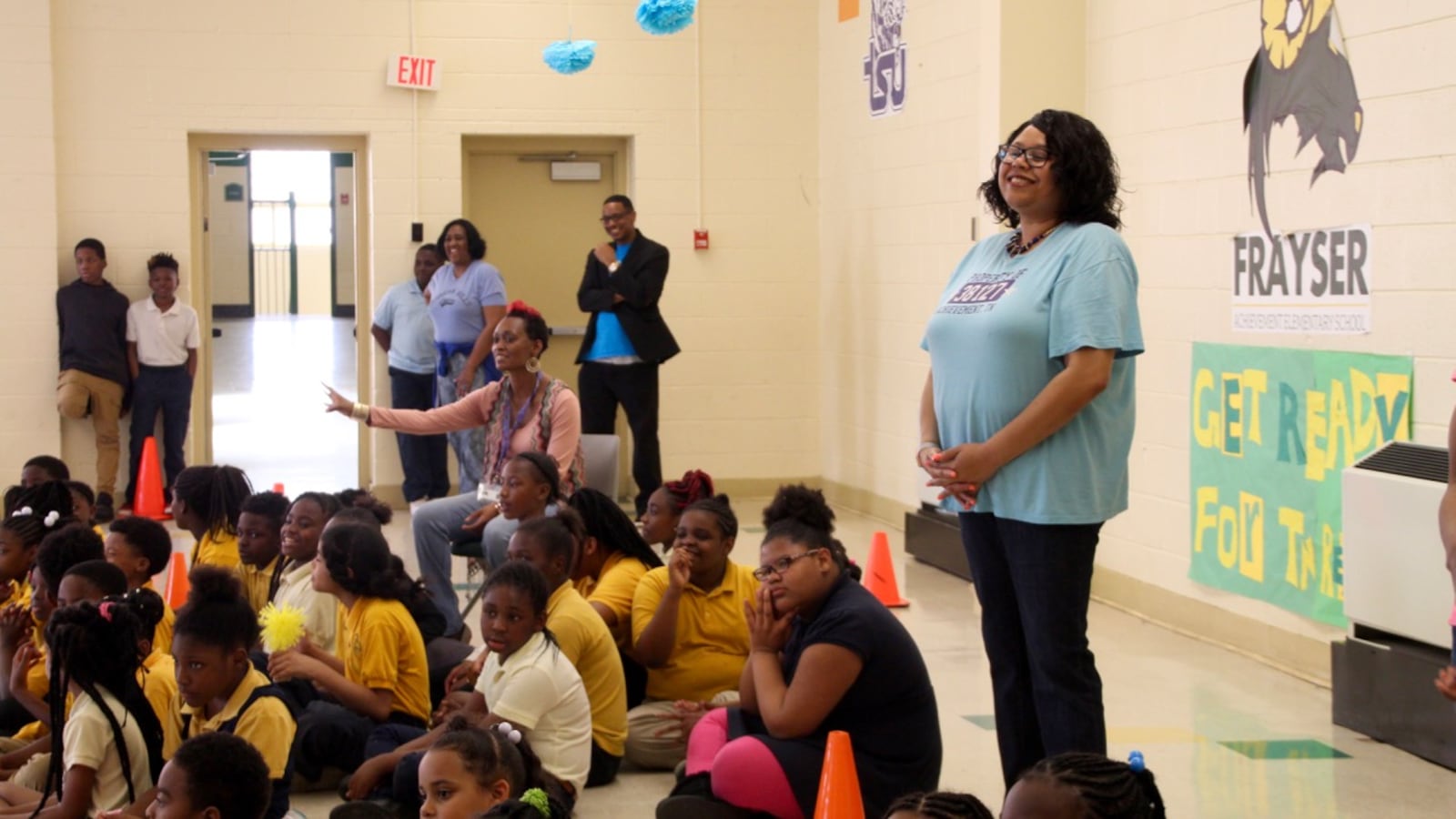Here, in a series we call “How I Lead,” we feature principals and assistant principals who have been recognized for their work. You can see other pieces in the series here.
Principal Yolanda Dandridge walks almost 14,000 steps a day — double the national average.
It takes a lot of walking to manage two schools. Dandridge has led Georgian Hills Achievement Elementary for the last two years and was previously the academic dean. She temporarily took over Frayser Achievement Elementary when the schools had to share space this year because of maintenance issues at Georgian Hill’s original building.
“I am constantly on the move,” Dandridge said. “How else can you keep up with elementary students?”
Both schools are part of the Achievement School District, which is charged with turning around the state’s lowest-performing schools but has struggled to accomplish the task.
This year, Georgian Hills not only left the bottom 5 percent but moved out of the bottom 10 percent. In 2016, before Dandridge took charge, Georgian Hills was in the worst 2 percent of schools.
Dandridge was honored by the achievement district for her work.
“She is a real standout among our principals of someone who understands what it takes to turn things around,” said interim achievement district leader Kathleen Airhart.
Dandridge talked to Chalkbeat about how she gets to know her students, her efforts to motivate teachers, and why school buildings are important.
This interview has been condensed and lightly edited.
What was your first education job and what sparked your interest in the field?

I tell my teachers to always stay focused on the “why” behind their careers. For me, my “why” was the fact that my little brother got all the way through elementary school without learning to read. He wasn’t able to read until the fifth grade. He came from a family of educators, and he still slipped through the cracks. If that could happen to him, it could happen to so many kids.
I started teaching in Rolling Fork, Mississippi, and I taught in that state for more than a decade. I came to Memphis as a teacher, I was asked later to consider taking on the principal role at Georgian Hills. I said, “You want me to do what?” Now, I’m grateful for all those years in the classroom and as an academic dean to prepare me for this role.
How do you get to know students even though you don’t have your own classroom?
Any chance to get into the classroom, I will. If a substitute teacher doesn’t come, which does happen sometimes, I will teach the students in that classroom for a day. I love getting to know students by helping out in the classroom.
I am also constantly walking the hallways of both schools. That’s how I start the morning — I greet students and their parents by name when they walk into the school. I walk students to their classrooms. I’m constantly monitoring the hallways.
When a new student registers for classes, the first thing the office staff knows to do is call me down so I can meet them.
How do you handle discipline when students get into trouble?
I really prefer to always consider the experiences that a child may have had prior to entering our building. When you approach discipline with a keen awareness of the types of situations a child might have or experience, it really makes you a better educator. And you understand that the best thing for us to do is to ensure that students know and understand that we have their best interests in mind. When children connect with you and other teachers in this way, discipline is less challenging.
What is an effort you’ve spearheaded at your school that you’re particularly proud of?
I’m very proud of what we’ve done at Georgian Hills and now at Frayser to really focus on our teachers.
Every Wednesday after school, we’ll have a period of professional development. I try to be attentive to what my teachers tell me they want to learn more about. There is a lot of coordination on lesson plans in particular. Teachers work together on their lesson planning, and I also will personally give feedback on a teahers’ lesson plans. My biggest, driving question is “What do my teachers need most?” They don’t need to be spending hours everyday lesson planning when they can collaborate. We can help there.
Tell us about a time that a teacher evaluation didn’t go as expected — for better or for worse?
Evaluating teachers has always provided me with the opportunity to hear and see the creativity and passion that our teachers bring to the classroom. My thought on evaluations is to take the anxiety out of it and ensure that teachers are comfortable and understand that the overall process is about improving their skills and enhancing the tools in their toolbox.
Tell us about a memorable time — good or bad — when contact with a student’s family changed your perspective.

When I was early in my teaching career in Mississippi, I had a student with a single mom. Her mom was an amazing support system for me and my classroom. She was always wanting to volunteer at the school. But she struggled to provide basic needs for her daughter — she was struggling to get a job. But she was trying so hard. There’s a stigma of parents, especially in low-income communities, not participating or caring about their child’s education. This mom was giving her all, and it changed my view of parental support. The school needed to find ways to also support her.
And so as a principal, I’m always thinking about how I can support my parents and invite them into the school. So that they feel welcome and wanted, and also so they are encouraged in their own role in their child’s education. We hold math and science nights, where parents learn how to do math games or science experiments at home with their kids. We provide them with materials and knowledge so that they can provide enrichment in their own home.
What issue in the education policy realm is having a big impact on your school right now? How are you addressing it?
We, like many schools in Memphis, don’t have the facilities we need for our students. Georgian Hills had to vacate our school building due to an issue with the roof. That created a hard environment for this school year — moving to a new building where we share space, and then me taking on that school as its school leader when the principal left. Honestly, I thought this year could break me as a school leader. But it didn’t, and it didn’t break our school either. We had a culture in place where our teachers felt supported among the chaos of the start of the year. After a year of repairs, we’re planning on moving back to our original building this fall.
But the issue here is that we don’t have the school buildings we need. Schools should be palaces in a community.
What’s the best advice you’ve received?
You have to mobilize people’s efforts to “win.” The first secret to this is to love your people. They are here for a purpose and you have to help them understand the higher purpose that they are here to serve. You have to have the right people in place, be responsible for developing them, and have the courage to let them go when student’s needs aren’t being met. Finally, transparency rules.

